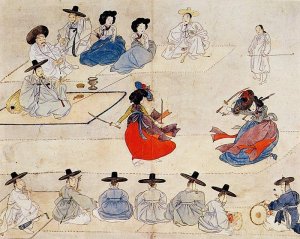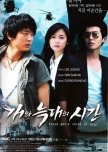Time between Dog and Wolf has a lot going for it. It’s beautifully directed, with striking visual storytelling, and it’s the rare k-drama that actually uses a foreign location shoot as more than expensive window dressing. Bangkok pops off the screen, its luminous temples and seedy clubs setting up key story moments in addition to providing grit and grandeur. The characters, “good” and “bad” alike, are three-dimensional, complex human beings and unlike many action-driven shows, the drama takes the time to develop their relationships before setting them on collision courses with each other. It also features a heroine who manages to be self-assured, sexy, morally grounded, and willing to call out the men around her when they lapse into testosterone-driven stupidity. Throw in Lee Jun Ki and Jung Kyung Ho as brothers-in-arms (and occasionally brothers armed against each other) and a great supporting cast of seasoned veterans and there’s much to celebrate.
The show’s strengths though have the unfortunate effect of making its flaws more glaring. Believable characters are wonderful until they’re suddenly asked by the script to act in completely unbelievable ways around the show’s midpoint. The logic gaps are jarring, but the bigger issue is the show’s ambivalence about what to do with its antiheroes. On one level, it wants us to feel the horror of its characters’ violent choices, but it also revels in the cool swagger of its pretty boys with guns. Forgiveness and understanding for their “lapses” come a bit too easily, undermining the impact of the story’s darker moments. The ending reflects this, with a rushed conclusion that tries to be simultaneously tragic and redemptive but falls short of both as it dodges the more unruly moral elephants in the room. If you’re content with a stylish action thriller, it’s an entertaining watch, but it’s frustrating because it comes close to being so much more.
Esta resenha foi útil para você?

























